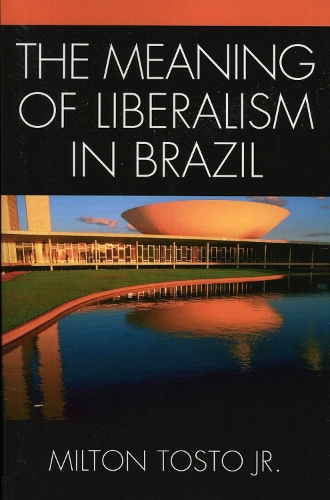
The Meaning of Liberalism in Brazil
(Paperback)
Publishing Details
The Meaning of Liberalism in Brazil
By (Author) Milton Tosto
Bloomsbury Publishing PLC
Lexington Books
24th January 2005
United States
Classifications
Professional and Scholarly
Non Fiction
International relations
Political parties and party platforms
320.510981
Physical Properties
Paperback
210
Width 154mm, Height 228mm, Spine 17mm
313g
Description
The Meaning of Liberalism in Brazil explores the consequences of globalization in emerging-market economies using Brazil as a case study. This well-researched and thought provoking book elaborates a new interpretation of Brazilian society by showing the relationship between political thought and economics, as well as how the two disciplines can interact, working together to shape a nation. Milton Tosto Jr. carefully traces the meaning of liberalism throughout Brazilian history, explaining liberalism's birth and collapse, and ultimately offers reasons why the new liberal institutions of Brazil have an excellent chance of prospering. Anyone interested in economics, political theory, or Latin American studies will find this unique and insightful volume helpful.
Reviews
The Meaning of Liberalism in Brazil, by Professor Tosto Jr., presents a lively and academic version of a "Borgean" riddle: Being a very well documented, and fairly interpreted history of liberal-conservative ideas in Brazil, it will surely become another obligatory chapter of this same history. -- Wanderley Guiherme dos Santos, Instituto Universitrio de Pesquisas do Rio de Janeiro
Tosto provides a theoretical approach to liberalism in Brazil, with a focus on contrasting definitions of this ideology and changes in liberal orientation from the 19th century to the present. Recommended. * Choice Reviews *
From the politics of conservative liberalism in the nineteenth century to the economics of neo-liberalism at the beginning of the twenty-first, Tosto charts the struggles for national integration and social inclusion that have bedeviled Brazil since Independence. This book explores the importance of ideas, particularly changing variants of liberalism, that have influenced Brazilians understanding of themselves, their country, and its place in the world. From aristocratic nation-building in the nineteenth century to the consolidation of a peoples' republic at the end of the twentieth, intellectuals and policy-makers have sought to confront patronage and sham constitutionalism - the problematic of how to deliver modernity to all rather than to the few. If Brazil was always seen as ... a country with a promising future, for Tosto the future has finally arrived. The long struggle within (and against) liberalism is at last delivering a market economy regulated by an accountable government with a strong legal system that respects the economic and political property rights of the many. Clientelism and sham constitutionalism have been superceded by an institutional framework that guarantees inclusion and opportunity. -- Colin M. Lewis, London School of Economics & Political Science
From the politics of conservative liberalism in the nineteenth century to the economics of neo-liberalism at the beginning of the twenty-first, Tosto charts the struggles for national integration and social inclusion that have bedeviled Brazil since Independence.
This book explores the importance of ideas, particularly changing variants of liberalism, that have influenced Brazilians understanding of themselves, their country, and its place in the world. From aristocratic nation-building in the nineteenth century to the consolidation of a "peoples' republic" at the end of the twentieth, intellectuals and policy-makers have sought to confront patronage and sham constitutionalism - the problematic of how to deliver "modernity" to all rather than to the few.
If Brazil was always seen as "... a country with a promising future," for Tosto the future has finally arrived. The long struggle within (and against) liberalism is at last delivering a market economy regulated by an accountable government with a strong legal system that respects the economic and political property rights of the many. Clientelism and sham constitutionalism have been superceded by an institutional framework that guarantees inclusion and opportunity.
Author Bio
Milton Tosto Jr. is Lecturer in International Relations at Faculdades Jorge Amado, Salvador, Bahia, Brazil.
